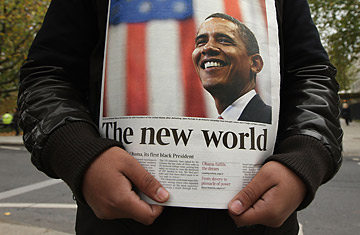
A vendor sells a copy of the Times featuring Barack Obama on the cover outside the U.S. embassy in London
(2 of 3)
Obama's decision to expend so much effort on a field organization was quietly revolutionary and a perfect fit for the larger political philosophy that he described when I spoke with him a few weeks ago. Obama insisted that while creating a new energy economy was his No. 1 priority, "we can't divorce the energy issue from what I believe has to be the dominant political theme underlying everything--the economy, health care, you name it. And that is restoring a sense that we're growing the economy from the bottom up and not the top down. That's the overarching philosophical change that we've got to have."
That was the substantive heart of his campaign and of this election. It was a stark difference between the candidates. Unlike many elections I've covered where the stakes were small and the differences between the candidates were minor, this was a big election, with big differences between the candidates. It was a referendum on the Reagan era. Try as he might to dissociate himself from the Bush Administration, John McCain remained a classic Reaganite. He believed in the unilateral exercise of American power overseas, with an emphasis on military might rather than diplomacy. He believed in trickle-down, supply-side, deregulatory economics: his tax plan benefited corporations and the wealthy in the hope that with fewer shackles, they would create more jobs. Obama was quite the opposite. Unlike Bill Clinton, whose purpose was to humanize Reaganism but not really challenge it, Obama offered a full-throated rebuttal to Clinton's notion that "the era of Big Government is over." He was a liberal, as charged. But the public was ready, after a 30-year conservative pendulum swing, for activist government.
Although McCain gave a gracious concession speech, the old fighter pilot understood that his argument was a loser--perhaps he even understood that the Reagan revolution had run its course--and so his strategy was to make a big election small. He attacked Obama relentlessly, often foolishly, sometimes scurrilously. The public didn't buy it. This was never more apparent than during the three presidential debates, which probably clinched the election for Obama. McCain was starting from a disadvantage. He had developed a bad case of Washingtonitis; he spoke Senatese, a language of process and tactics that sometimes approached incoherence. In 2000, McCain spoke with a bracing clarity. "The reason why we don't have a patients' bill of rights," he would say, "is because the Republican Party is in the pocket of the insurance industry and the Democrats are in the pocket of the trial lawyers." In the 2008 debates, he skittered from attack to attack, lacking the vision and patience to explain what he would actually do as President. Obama's best moments--according to the instant reaction of focus-group viewers--came when he calmly set forth what he would do about the economy, health care, education. Those who say Obama won because of the financial crisis are telling only half the story. He won because he reacted to the crisis in a measured, mature way. He won because in the second debate, he explained to a gentleman named Oliver Clark, in terms that anyone could understand, the financial collapse and the need for a federal bailout.
